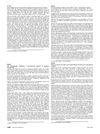 37 citations,
March 1990 in “The Journal of Pediatrics”
37 citations,
March 1990 in “The Journal of Pediatrics” Toxic shock syndrome is caused by a complex interaction of bacterial toxins and the immune system, and understanding this can help improve diagnosis and treatment.
 20 citations,
September 2020 in “Journal of Translational Medicine”
20 citations,
September 2020 in “Journal of Translational Medicine” Mesenchymal stromal cells may help treat severe COVID-19, but more research is needed to confirm their effectiveness.
 3 citations,
May 2014 in “Journal of The American Academy of Dermatology”
3 citations,
May 2014 in “Journal of The American Academy of Dermatology” Dermatologists greatly affect inpatient diagnosis and treatment of skin conditions, especially in spotting infections in patients with weakened immune systems.
 1 citations,
March 2021 in “The Journal of Sexual Medicine”
1 citations,
March 2021 in “The Journal of Sexual Medicine” The letter suggests testosterone replacement therapy might worsen COVID-19 outcomes.
 185 citations,
August 2020 in “Mayo Clinic Proceedings”
185 citations,
August 2020 in “Mayo Clinic Proceedings” Men are more likely to have severe COVID-19 cases and fatalities than women due to factors like lifestyle, aging, and biological differences.
 113 citations,
July 2020 in “Communications biology”
113 citations,
July 2020 in “Communications biology” Men, especially older ones with health issues like prostate cancer, may have worse COVID-19 outcomes and could benefit from therapies targeting male hormones.
 125 citations,
August 2020 in “Frontiers in Immunology”
125 citations,
August 2020 in “Frontiers in Immunology” Men generally have more severe COVID-19 cases and higher death rates than women due to biological differences.
 26 citations,
August 2020 in “Dermatology Research and Practice”
26 citations,
August 2020 in “Dermatology Research and Practice” COVID-19 can cause various skin problems, including reactions to protective gear and medication, with different rates reported worldwide, and more research is needed to fully understand these skin issues.
 84 citations,
March 2010 in “Infectious Disease Clinics of North America”
84 citations,
March 2010 in “Infectious Disease Clinics of North America” The document concludes that rapid identification, isolation, and strict infection control are crucial to manage SARS outbreaks.
 42 citations,
June 2020 in “Seminars in Oncology”
42 citations,
June 2020 in “Seminars in Oncology” Sex hormones may affect COVID-19 severity, with men often faring worse, and targeting related pathways could offer treatment options.
 12 citations,
August 2020 in “Annals of Oncology”
12 citations,
August 2020 in “Annals of Oncology” Androgen deprivation therapy might be better for preventing COVID-19 than treating it.
 129 citations,
November 2005 in “Internal Medicine Journal”
129 citations,
November 2005 in “Internal Medicine Journal” Early detection and intensive treatment of diseases caused by Staphylococcus aureus toxins are crucial for reducing severe health effects.
 86 citations,
January 2019 in “Frontiers in Immunology”
86 citations,
January 2019 in “Frontiers in Immunology” The document concludes that diagnosing and treating Human African Trypanosomiasis is challenging, but new treatments like fexinidazole are promising.
 9 citations,
March 2021 in “Hormones”
9 citations,
March 2021 in “Hormones” COVID-19 may affect male fertility and women might have better outcomes due to hormonal and immune differences.
 6 citations,
September 2020 in “Journal of The American Academy of Dermatology”
6 citations,
September 2020 in “Journal of The American Academy of Dermatology” Severe male balding may increase the risk of serious COVID-19, and treatments that reduce androgens or block a specific enzyme might help protect these individuals.
 2 citations,
July 2008 in “Hair transplant forum international”
2 citations,
July 2008 in “Hair transplant forum international” MRSA infections can occur in hair transplant surgeries, so it's important to test for it before treatment, keep everything clean, and follow treatment based on test results.
12 citations,
April 2020 in “Medical hypotheses” Men on 5-alpha-reductase inhibitors might have worse COVID-19 outcomes.
88 citations,
September 2003 in “Clinical endocrinology” Hormone treatment for transsexual individuals is effective but carries risks like thromboembolic events and mood changes, with most side effects being minor and reversible.
 9 citations,
July 2021 in “Essays in Biochemistry”
9 citations,
July 2021 in “Essays in Biochemistry” Sex hormones may influence COVID-19 severity, with males at higher risk, and certain hormone therapies could potentially treat the virus.
 June 2023 in “Pharmaceuticals”
June 2023 in “Pharmaceuticals” Men and women respond differently to drugs for COVID-19, high cholesterol, and diabetes, which suggests a need for personalized treatments.
 1 citations,
March 1995 in “JAMA”
1 citations,
March 1995 in “JAMA” The woman's hair loss is likely stress-related and should improve without treatment.
 December 2023 in “Curēus”
December 2023 in “Curēus” A woman with lupus had rare severe symptoms but improved with treatment.
 January 2023 in “Open veterinary journal”
January 2023 in “Open veterinary journal” Cow blood vessel cell secretions helped heal rat burn wounds and may treat burns and hair loss.
 22 citations,
October 2018 in “British Journal of Haematology”
22 citations,
October 2018 in “British Journal of Haematology” Women have a higher risk of blood clots from hormonal factors and need careful treatment, especially during pregnancy.
 21 citations,
February 2021 in “BMJ case reports”
21 citations,
February 2021 in “BMJ case reports” Anabolic steroid users may face higher risk of severe COVID-19.
 5 citations,
December 2021 in “Physiological Research”
5 citations,
December 2021 in “Physiological Research” Men, particularly those with hair loss, are more likely to get the virus, and those with prostate cancer may have milder symptoms. Testosterone's role in the disease is unclear, and the virus doesn't seem to harm male fertility. Women with PCOS might be at higher risk. More research is needed.
 4 citations,
January 2018 in “Cancer treatment and research”
4 citations,
January 2018 in “Cancer treatment and research” The document concludes that systemic therapy is becoming more important in treating head and neck cancer, with new treatments showing promise.
 January 1982 in “Journal of The American Academy of Dermatology”
January 1982 in “Journal of The American Academy of Dermatology” Experts discussed treatments for skin conditions in children, emphasizing hydration, cautious medication use, and early intervention for infections.
 176 citations,
May 2020 in “Dermatologic Therapy”
176 citations,
May 2020 in “Dermatologic Therapy” COVID-19 can cause different skin symptoms that may help with early diagnosis and show how severe the disease is.
 115 citations,
June 2004 in “Pediatrics”
115 citations,
June 2004 in “Pediatrics” Children, especially teenagers, can get severe SARS-CoV infection with symptoms similar to adults, but they typically recover well with supportive care.




























